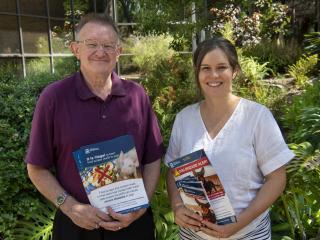The Department of Primary Industries and Regional Development (DPIRD) showcased its role in preventing and responding to exotic animal diseases at the recent Western Australian Environmental Health Association conference.
Department veterinarians presented on actions to prevent devastating livestock diseases, such as African swine fever and foot-and-mouth disease, occurring in WA and the State’s response to the serious dog disease, ehrlichiosis.
Veterinary officer Martin Matisons told the gathering with the threat of African swine fever close to northern Australia, it was vital that WA food businesses were aware of their responsibilities when disposing of food waste.
“Food waste left over from cafes, restaurants and other food outlets could contain or have had contact with meat or non-Australian dairy products,” Dr Matisons said.
“If this food waste or ‘swill’ is fed to pigs, it could introduce diseases, such as African swine fever or foot-and-mouth disease into Australia’s livestock.
“It is illegal for food businesses to knowingly supply food waste containing meat or that has been in contact with meat products for pig feed.
“Businesses must also dispose of this type of food waste in a way that it can’t be eaten by pigs.”
Environmental health officers contribute to the protection of Australian livestock when they audit food businesses and check their waste disposal practices.
Department veterinary officer Jess Longley provided an overview of the ongoing response to the detection of the tick-borne disease ehrlichiosis in northern WA.
“Ehrlichiosis is a serious disease of dogs that occurs when an infected brown dog tick bites the dog,” Dr Longley said.
“The disease is now established in northern WA and the Northern Territory, and infected ticks have been found in northern South Australia.
“DPIRD is working with affected WA communities and private veterinarians to raise awareness and carry out further surveillance.
“Contact your vet if your dog is showing signs of fever, lethargy, enlarged lymph nodes, loss of appetite, weight loss or bleeding disorders – especially if it has spent time in northern WA.”
Dog movement conditions are in place in the Kimberley to reduce the spread of ehrlichiosis to southern WA.
Dog owners leaving the Pilbara, Gascoyne and northern Goldfields are also encouraged to follow these conditions and dog rehoming agencies are asked to have dogs tested for ehrlichiosis prior to moving them to southern WA.
For more information see our webpages on safe feed for pigs and ehrlichiosis.

Media contacts:
Megan Broad/Katrina Bowers, media liaison
+61 (0)8 9368 3937
